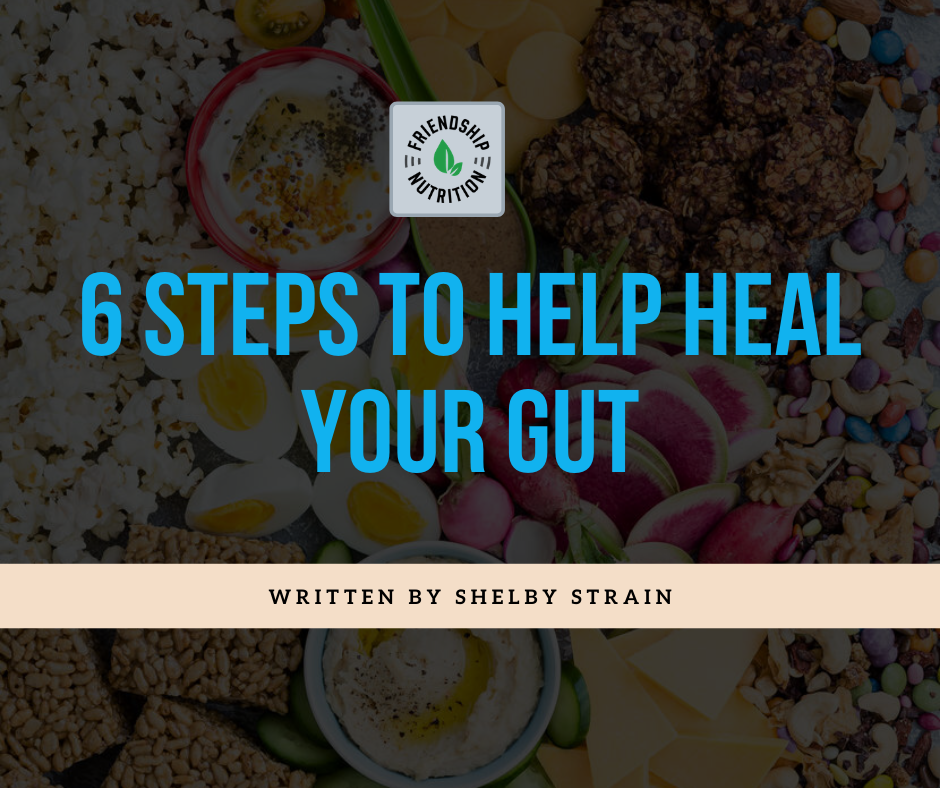6 Steps to Help Heal Your Gut
Written by Shelby Strain, Friendship Nutrition Coach
Here are a few tried and true ways that I have put into my daily routine to successfully decrease unwanted symptoms of poor gut health. While some of these may sound like the extreme, be aware that they aren’t intended to be done for the rest of your life. When I experience flare ups, I will resort back to these practices for 15-30 days as a kind of reset to the system. Some of these I practice regularly, like avoiding dairy, because I know that dairy is a direct cause of my symptoms. Finally, keep in mind that some of these things may not work for you, as all bodies are different, but it doesn’t hurt to try. Let me know if any of these practices work for you!
1. Eat as many fresh foods as possible. By fresh I mean avoiding all boxes, packaging, cans etc. This might mean you need to make your own foods (i.e. peanut butter, almond milk etc). Make Your Own Almond Butter→ Did you know that if a certain food item has less than 19% of an ingredient, then that ingredient does not need to be listed? Preservatives and chemicals are a common cause of stomach flare ups.
2. Do NOT eat raw veggies. I know what you’re thinking, “a nutritionist really just told me not to eat raw veggies?!” Sometimes, eating raw veggies can be very harsh on the digestive system and your body may be unable to digest certain kinds. Steaming veggies allows for better absorption and overall digestion. → Brussels sprouts, tomatoes, potatoes, cauliflower, asparagus, and mushrooms are all foods you should definitely not be eating raw if you are trying to avoid stomach upsets.
3. Avoid eating dairy products EXCEPT cultured dairy products (i.e. cultured Greek yogurt, kefir, cultured cottage cheese, etc). Even those with a dairy intolerance (like myself) can eat cultured dairy because it already has the good bacteria needed to digest properly. Thus, avoiding discomfort that can be caused by regular milk product → Tip: there’s milk in more food products than you think! Dressings, sauces, protein powder, spices, drinks, chips etc. Make sure you’re carefully reading ingredient labels! Nancy's and Fage are both great brands to choose from. Just make sure you grab the plain and full fat options, these will be the least processed.
4. Drink bone broth! Good, quality bone broth has many vitamins and nutrients such as collagen, proline, glycine, and glutamine that all help heal and seal the gut. It can also help fight food sensitivities by helping the growth of the good bacteria in your stomach. → Kettle & Fire is my favorite and can be easily used to make soup or enjoyed by itself!
5. Don’t take too many probiotics. This can wreak havoc on your digestive system. Your body creates its own bacteria and using a good probiotic can help. But taking too many at once can do more damage than good! Too many together will cause them to fight each other off. Sometimes not taking any is better than taking any at all.→ If you are using a probiotic, make sure you're using a probiotic that includes Bacillus Coagulans. This bacteria targets yeast and candida overgrowth.
6. Supplement with l-glutamine. Did you know that l-glutamine….
Is an essential amino acid that our body already creates
Promotes muscle growth and athletic performance
help heal ulcers and leaky gut by repairing damaged stomach lining
Can help curb cravings for sugar and alcohol
Promotes digestive health
→ Here is the one I use l-glutamine everyday in my post workout shakes. Since our stomachs and intestines are made of tissue, it only makes sense that this can help heal those muscles too.

